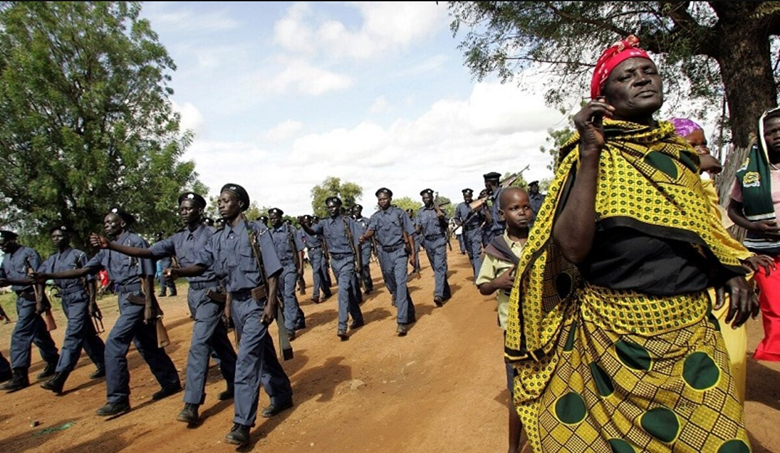Security sector reform is an underappreciated but vitally important variable when studying post-conflict nations. The formation, evolution, and destruction of security institutions impact both domestic and international conflict. Understanding critical connections and developments inside a security sector can introduce researchers to a beautiful world of institutional causal relationships. However, it is decidedly unsexy to study how bureaucratic sausage is made. A quick library database search yields only 2000 results for “security sector reform”. This is a weak showing compared to “transitional justice”, which generates 12,000 hits. Despite its marginal appeal and minimal literature available, each of the central international relations paradigms would agree on the importance of studying security sector reform.
Albrecht Schnabel and Hans-George Ehrhart, in their 2005 compendium on the topic, describe security sector reform (SSR) primarily in terms of post-conflict rebuilding of the local security sector and military forces as part of the larger democratization process. Linked closely with the peacebuilding process, security sector reform is part of the “political process of transformation from a state of war or violent conflict to one of stability and peace…requiring diplomatic, political, and economic factors”. SSR is an avenue for external nations and intergovernmental organizations to cooperate with transitioning nations. Beyond peacebuilding and external influence, as Bleiker and Krupanski describe, SSR is tightly connected to rule of law. More than just civil-military relations, this central aspect of statehood is also a defining factor for domestic and international security policies. Although SSR is a concept that speaks to a specific time in a nation’s history, the linkages between the military and its directive political institutions inform later state policy choices. The evolution of civil-military affairs and the partners that influence bureaucratic development impact choices about broader international security.
The overlapping Venn diagrams of SSR and international relations make it an ideal variable to explore and understand when looking deeper into causal relationships in security studies. Understanding SSR through the lenses of realism, liberalism, and constructivism shows the importance of this crucial but rarely studied topic.
Realist assumptions point to the importance of SSR because reforms define material pathways for military power. The size, scope, and control of a security sector within a country bear directly on the relative power of a nation. This is specifically important in transitioning nations seeking to rebuild military power. Should the SSR enforced by Allied powers on Weimar Germany following WWI have been more thorough, perhaps military authoritarianism would not have followed. Clear civil-military checks and balances, like mandated troop limits and military-specific legal restrictions, can prevent a powerful military from regaining governmental control.
Liberalist assumptions also emphasize SSR because bureaucratic development more clearly delineates decision-making pathways within a domestic system by taking an authoritarian military out of the loop. The development of a security sector can impact state preferences based on the history of military political influence or the shifting powers within the larger security sector. SSR enables a military to maintain combat power but more tightly connects the military to rule of law. Sierra Leone, following a lengthy civil war and with the help of the United Kingdom, used SSR to professionalize internal law enforcement units separate from the military which previously controlled the government. Differentiation of security forces opened up preferences and options for international security actions.
Constructivist theorists view SSR as significant because changes in civil-military prerogatives reflect shifts in domestic identities and interests that result from improvements in rule of law and domestic checks and balances. More important than military might, constructivism cares about how state identities and interests are influenced by culture and history. SSR is institutional development based on those same factors. The history and culture not only of the transitioning state but also of neighboring and regional countries shape how a security sector weaves through multiple institutions. Following the end of the Cold War, Georgia’s SSR enabled the development of its identity as a newly independent state with its own clear military strategy.
While every post-conflict country goes through a review of security force capabilities, roles, and responsibilities, the overall quality of the current literature on security sector reform is inadequate, and it’s not for lack of cases. Few researchers seem interested in how bureaucracies are built and connected, as it is not as glamorous as unitary theories of development. Just because SSR will not win any popularity contests, it is still a topic of significant importance. More scholars should explore security sector reform not only for its value in each of the traditional international relations paradigms but also for its unrealized potential to impact the broader security studies field.
Alexandra Gerbracht (née Vogel) is a Lieutenant Colonel in the U.S. Marines and received her bachelor’s degree in International Relations and Political Science, then commissioned through the University of Wisconsin-Madison ROTC program. She attended Marine Corps Engineer School and served as the Construction Platoon Commander, Engineer Company Executive Officer, and in 2004 deployed in support of Operation IRAQI FREEDOM II.
In May 2006, Lieutenant Colonel Gerbracht was assigned to the Pentagon with Headquarters Marine Corps Plans, Policies, and Operations in the Expeditionary Policies Branch (POE-30) as the Mine Countermeasures and Naval Surface Fires action officer. During this tour she attended The George Washington University Elliott School and earned a Master’s Degree in Security Policy Studies. In 2008, she was selected as an Olmsted Scholar and from 2008-2009 attended the Defense Language Institute Japanese Language Program. In the summer of 2009 Lieutenant Colonel Gerbracht moved to Kyoto, Japan to attend Ritsumeikan University. She graduated in 2011 with her second Master’s Degree in International Relations and was subsequently assigned to 7th Engineer Support Battalion, 1st Marine Logistics Group in Camp Pendleton, CA. In 2012 she deployed to Afghanistan in support of Operation ENDURING FREEDOM and served as the Group Engineer Officer, Plans Officer, and Current Operations Officer.
In 2014, Lieutenant Colonel Gerbracht was selected for resident Command and Staff College where she participated in the Advanced Studies Program and received a Master’s of Military Studies. Lieutenant Colonel Gerbracht continued to the School of Advanced Warfighting receiving a fourth Master’s Degree in Operational Studies and the Marine Air Ground Task Force Planner Occupational Specialty. After her SAW graduation she was assigned to United States Marine Corps Forces, Central Command (MARCENT) at MacDill Air Force Base in Tampa, Florida where she served as Strategic Plans Officer and as the Contingency Plans Officer in support of Marine Supporting Operational Plans. She served as the executive officer of Marine Corps Engineer School from 2019-2021 in Camp Lejeune North Carolina. She moved from a training command to officer education and taught graduate-level leadership and Warfighting curriculum at Marine Corps Command and Staff College in Quantico, VA for one year before moving up to her current position as Warfighting Department Head. She began her journey for a Ph.D. in political science at the Schar School at George Mason University in 2021.
Lieutenant Colonel Alexandra Gerbracht is married to Lieutenant Colonel Robert Gerbracht (USMC) and has three young children. She is a graduate of Officer Candidates School, The Basic School, The Marine Corps Combat Engineer School Basic Officer Course, Expeditionary Warfare School, Marine Corps College of Command and Staff, the School of Advanced Warfighting, and Air War College and is an alumnus of the Olmsted Scholar Program, The George Washington University, and Ritsumeikan University. She has received the Meritorious Service Medal (2nd Award), Navy and Marine Corps Commendation Medal (3rd Award), and the Navy and Marine Corps Achievement Medal.
Photo can be found here.




